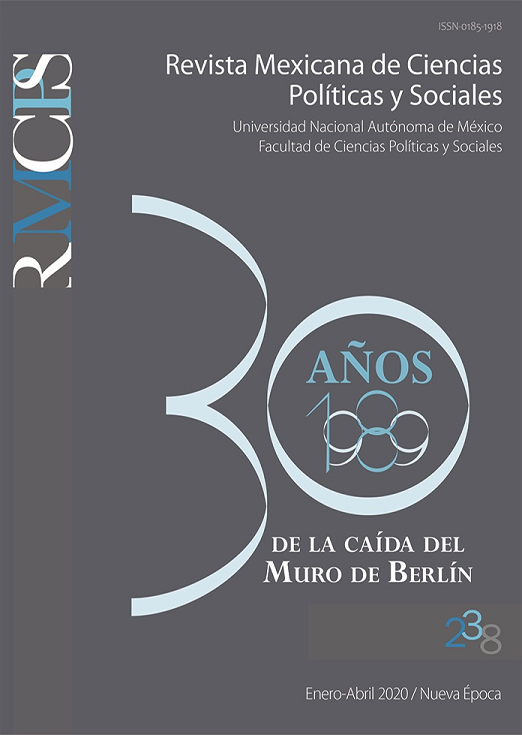1989: The Beginning of Blurred Times. Reflections on Social Sciences and Culture
Main Article Content
Abstract
Downloads
Article Details
Citas en Dimensions Service
References
Alexander, Jeffrey (1995) Fin de Siécle Social Theory. Relativism, Reduction, and the Problem of Reason. Londres: Verso.
Alexander, Jeffrey (2006) The Civil Sphere. Oxford: Oxford University Press.
Arvo Pärt (1978) “Spiegel im Spiegel” en Alina [cd]. Alemania: ecm Records. Disponible en: https://www.arvopart.ee/en/arvo-part/work/544/
Barros Horcasitas, José Luis y Javier Hurtado (1991) Transiciones a la democracia en Europa y América Latina. Ciudad de México: Porrúa.
Beck, Ulrich (1998) La Sociedad del Riesgo. Madrid: Paidós.
Benhabib, Seyla (1992) Situating the Self: Gender, Community and Postmodernism in Contemporary Ethics. Reino Unido: Routledge.
Bernstein, Richard (1983) La reestructuración de la teoría social y política. Ciudad de México: Fondo de Cultura Económica.
Butler, Judit (2008) Cuerpos que importan. Sobre los límites materiales y discursivos del sexo. Madrid: Paidós.
Derrida, Jacques (2012) Espectros de Marx. Madrid: Trotta.
Furet, François (1995) El Pasado de una ilusión. Ensayo sobre la idea comunista en el siglo XX. Ciudad de México: Fondo de Cultura Económica.
Garton Ash, Timothy (2009) “1989 Changed the World. But Where Now for Europe?” The Guardian, 4 de noviembre.
Giddens, Anthony (2003) Un mundo desbocado. Barcelona: Taurus.
Glucksmann, André (1976) La cocinera y el devorador de hombres. Ensayo sobre las relaciones de Estado, el Marxismo y los Campos de Concentración. Caracas: Monte Ávila Editores.
Habermas, Jürgen (2014) Teoría de la Acción Comunicativa, t. 2. Madrid: Trotta.
Havel, Václav (2013) [1979] El poder de los sin poder. Madrid: Ediciones Encuentro/Universidad CEU San Pablo.
Hobsbawm, Eric (2000) Historia del siglo XX. Barcelona: Crítica.
Honneth, Axel (2011) La Sociedad del Desprecio. Madrid: Trotta.
Judt, Tony (2005) Postguerra. Una historia de Europa desde 1945. Madrid: Taurus.
Luhmann, Niklas (2007) La Sociedad de la Sociedad. Ciudad de México: Herder.
Schmitter, Philippe y Guillermo O’Donnell (1986) Transitions from Authoritarian Rule: Tentative Conclusions about Uncertain Democracies, vol. IV. Baltimore/Londres: The John Hopkins University Press.
Schmitter, Philippe y Karl Terry (1995) “Modes of Transition in Latin America, Southern and Eastern Europe” en Pridham, Geoffrey (ed.) Transitions to Democracy. Darmouth: Aldershot, pp. 153-172.
Solzhenitsyn, Aleksandr (1962) “Un día en la vida de Iván Denísovich” Novy Mir.
Wieviorka, Michel y Craig Calhoun (2013) “Manifiesto por la Ciencias Sociales” Revista Mexicana de Ciencias Políticas y Sociales, 58(217): 29-60.

La Revista Mexicana de Ciencias Políticas y Sociales publicada por la Universidad Nacional Autónoma de México se distribuye bajo una Licencia Creative Commons Atribución-NoComercial-SinDerivar 4.0 Internacional.
Basada en una obra en http://www.revistas.unam.mx/index.php/rmcpys/
La RMCPyS autoriza a sus colaboradores que suban una copia de sus trabajos publicados en sus webs personales o en cualquier repositorio de acceso abierto, siempre y cuando se mencione específicamente a la Revista Mexicana de Ciencias Políticas y Sociales como fuente original de procedencia, citando el año y número del ejemplar respectivo y añadiendo el enlace a la página web donde este órgano editorial puede ser consultado in toto, de manera abierta y gratuita en: <www.revistas.unam.mx/index.php/rmcpys>.
Las y los lectores tienen libertad para:
Compartir, copiar y redistribuir el material en cualquier medio o formato.
El licenciante no puede revocar estas libertades en tanto usted siga los términos de la licencia.
De acuerdo con los siguientes términos:
- Atribución: la/el lector/a debe reconocer el crédito de una obra de manera adecuada, proporcionar un enlace a la licencia, e indicar si se han realizado cambios. Puede hacerlo en cualquier forma razonable, pero no de forma tal que sugiera que tiene el apoyo del licenciante o lo recibe por el uso que hace.
- No comercial: la/el lector/a no puede hacer uso del material con fines comerciales.
- Si se mezcla, transforma o se desarrolla a partir de la obra licenciada, no se permite la distribución del material modificado.
Cargos por gestión de artículos
La Revista Mexicana de Ciencias Políticas y Sociales NO cobra tarifas por recibir, procesar o publicar los artículos (Article Processing Charge [APC]) enviados por los autores.





